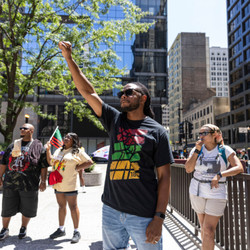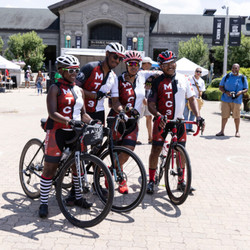Saturday was a day for celebration and reflection, with many Chicagoans taking to the streets and gathering across the city to commemorate the end of slavery in the United States.
In the Loop, a few hundred people marched in honor of Juneteenth, a celebration with roots in Texas that celebrates June 19, 1865 — the date when the last enslaved African Americans learned they had been freed.
The day was recognized as a state and federal holiday in orders by Gov. J.B. Pritzker and President Joe Biden earlier this week.
The march led to Daley Plaza, where attendees danced, cheered and intently listened to a series of speakers that included the Rev. Jesse Jackson Sr. and Sen. Tammy Duckworth. Many also waved Black Liberation and Black Lives Matter flags.
“It is very affirming, it’s liberating,” said 34-year-old Brianna Sharpe as she scanned the diverse crowd at the March for Us rally. “I feel love, I feel peace, I feel joy, this is a really good feeling that I feel.”
Sharpe, of Fellowship Chicago, a Baptist church in Fuller Park, said she was thrilled that Juneteenth had finally been recognized as a federal holiday and viewed it as a step in the right direction.
“It means that our voices — Black people, people of color — our voices have been heard,” Sharpe said. “I’m just so excited because our ancestors have fought so hard to get to this moment… It is so deserving.”
But Sharpe and many others noted that making Juneteenth a federal holiday wasn’t enough.
“We’re not settling for symbolism,” said Ashley Munson, the rally’s lead organizer. “It’s great … but we still have so much to do.”
Munson said the fight for “equitable solutions” like reparations for Black Americans and putting a stop to voter suppression laws, must continue.
“We have to still press for policies and legislation that will push not only the Black folks forward because when we’re better, we’re all better, right?” Munson said.
:no_upscale()/cdn.vox-cdn.com/uploads/chorus_asset/file/22669464/Screen_Shot_2021_06_19_at_6.08.44_PM.png)
Munson hopes to address some of those issues with Illinois Black Collective, a new nonprofit organization she announced Saturday.
“Our goal is to work together, despite our personal preferences, to create a Black agenda that will uplift our people, that will hold each other accountable and focus on the plight of the actual Black community,” Munson said.
Organizers also took a moment to honor the legacy of 17-year-old activist Caleb Reed, who was fatally shot last August, with a mural. Reed spoke at the 2020 March for Us rally about what it means to be a Black man in Chicago.
Tears streamed down the faces of some as Reed’s parents took turns addressing the crowd.
“I miss his presence every day,” Reed’s mother, Sabrina Pleasant, said via sign language. “He was so precious and loved by so many people. Losing Caleb was like a part of my heart being broken. And there was no one who can fill that void.”
Another event that took place to commemorate Juneteenth was the Freedom Ride Bronzeville — a nod to the civil right activists who protested segregated bus terminals in 1961.
For the second consecutive year, about 300 bicyclists met and pedaled 12 miles through the streets.
“We’re riding for the same rights that we were fighting for 100 years ago,” organizer Jason Easterly said. “We’re still fighting things like racial injustices and fighting police killing African Americans. So, yes, I feel like we’ve made some, some strides from last year, but by no stretch of the imagination are we done fighting.”
This year, the group stopped in front of the DuSable Museum of African American History, which reopened Saturday for the first time since it closed its doors amid the pandemic.
DuSable had a full schedule of activities, including live music and a block party. Dozens of people who came out to the reopening set up lawn chairs and held picnics under trees as they sought shelter from the scorching sun.
Tracy Johnson, of Kenwood, was one of the many people sitting on the grass enjoying the day. She said she had planned to stop working on Juneteenth last year after seeing the worldwide protests sparked by George Floyd’s death. She was “overwhelmed” when she learned it was made a federal holiday.
“It’s progress and progress doesn’t come overnight,” Johnson said.






